#Social Sharing Backlinks list
Explore tagged Tumblr posts
Text
Social Sharing and Profile Backlinks List 2024
How High DA and PA Websites Boost SEO

In the world of digital marketing, building a strong online presence is key to success. One proven way to improve your visibility and search engine ranking is through social sharing and creating profile backlinks on high Domain Authority (DA) and Page Authority (PA) websites. These links not only increase brand awareness but also drive organic traffic while strengthening your SEO strategy.
Here’s how Topics Quest is leveraging this approach. Check out our profiles on these high-authority platforms:
LinkedIn
Instagram
Pinterest
Wakelet
Fuzia
Mastodon
YouTube
Mighty Networks
SpeakerDeck
TED
Behance
Issuu
Wefunder
Indiegogo
Linktree
Blurb
Goodreads
Why High DA and PA Websites Matter
Websites with high DA and PA are trusted by search engines, making backlinks from these platforms highly valuable. Such links pass authority to your site, helping to improve your rankings and diversify your backlink profile. This diversity reduces the risk of search engine penalties and strengthens your overall SEO efforts.
Benefits of Social Sharing and Profile Backlinks
Increased Traffic: Sharing content across these platforms can drive more visitors to your website.
Improved SEO: Backlinks from high-authority websites signal trust and relevance to search engines.
Enhanced Credibility: Having a presence on reputable platforms builds trust with your audience.
Wider Audience Reach: These platforms allow you to connect with different audience groups.
Stronger Brand Awareness: Regular engagement ensures your brand remains visible and memorable.
How to Start Building Backlinks
Create Profiles on High-Authority Platforms: Set up profiles on trusted sites like LinkedIn and Behance.
Optimize Your Content: Include a professional bio, a link to your website, and share valuable updates.
Engage with Users: Interact with your audience by sharing useful content and responding to their comments.
Track Results: Use analytics tools to monitor the performance of your backlinks and traffic.
Conclusion
Social sharing and profile backlinks are powerful tools for increasing online visibility and building trust. By following Topics Quest example and creating profiles on high DA, PA websites, you can drive traffic, improve SEO, and establish your brand as a leader in your field. Start today, and watch your digital presence grow!
#Backlinks list#backlinks#profile backlinks#Profile backlinks list#Social Media Website list#Social Media Backlinks list#Social Sharing Backlinks list
2 notes
·
View notes
Text
Denver SEO Company: SEO Tips you Need to Know!!!!
Denver SEO Company: SEO Tips you Need to Know!!!
Each page on the SEO Expert in Denverwebsite must be optimized with a focus on On-Page SEO. This includes:
Titles and Meta Descriptions:
Ensure each page has catchy, descriptive titles with the right keywords. Use meta descriptions that invite users to click on results.
Headings (H1, H2, H3): Use heading tags to structure the content and make it easier to read. This also helps Google better understand the theme of the page.
Optimized Images:
All images must have ALT attributes with appropriate descriptions and must be compressed to improve loading. Practical Tips: Use main keywords in the title and URL. Insert internal links to guide the user to other relevant pages on the site. Create friendly, short and descriptive URLs.
Creating Quality Backlinks:
Backlinks, or links from other websites that point to yours, are a determining factor in Google rankings. Earn quality backlinks by:
Publish guest posts on relevant blogs:
Create partnerships with other companies and ask for links to the SEO Expert in Denver website. http://denverseo.company/ Publish case studies and financial reports that other companies may want to reference.
Practical Tips:
Build links on authority sites like media outlets and finance blogs. Avoid link building techniques that are considered spam, as Google may penalize the site. Have a digital Public Relations strategy, sending press releases.
Local SEO: Capture Customers in the Region:
SEO Expert in Denver can significantly benefit from local SEO, especially to attract customers in the Northeast region. For that:
Optimize your listing on Google My Business. Enter information about SEO Expert in Denver's location on the website. Encourage your customers to leave reviews online. Practical Tips: Include location in keywords, such as “Financial consultancy in Recife”. Use Google My Business to highlight events and related posts.
Video Content:
Video content is a powerful tool for SEO as it increases dwell time on the website. SEO Expert in Denver can create explanatory videos, interviews with experts and customer testimonials, covering topics such as “How to get credit for my company” or “The role of consultancy in fundraising”.
Practical Tips:
Publish videos to YouTube with optimized descriptions and website links. Integrate videos on the main pages of the SEO Expert in Denver website to increase engagement.
Off-Page SEO: Increasing Brand Presence:
In addition to backlinks, it is important to increase SEO Expert in Denver’s presence on other platforms and social media. Have a well-defined content strategy for LinkedIn, Instagram and Facebook, where you can share financial insights, promotions and educational materials.
Continuous Analysis and Adjustments:
SEO is a strategy that requires continuous analysis. Use tools like Google Analytics to track traffic and understand user behavior on your website. Adjust the strategy as necessary, always seeking to improve rankings and attract more qualified leads.
Practical Tips:
Monitor top-performing pages and update old content. Test different keywords and content strategies to see what generates the most leads.
Pillar Content Creation:
Create pillar content, which covers broad topics such as “Fundraising for Companies”, linking to more specific content (content clusters). This creates a hierarchical content structure that makes it easier for users to navigate and improves SEO. https://denverseo.company/about/
Conclusion:
To attract more qualified leads and improve SEO Expert in Denver website authority, it is crucial to implement a thorough SEO strategy. From technical optimization to creating valuable content and quality back links, each action contributes to organic growth. With these practices, SEO Expert in Denver can stand out as a reference in the financial consultancy and fundraising sector
25 notes
·
View notes
Text
Unlocking the Power of Off-Page SEO: A Comprehensive Guide to Boost Your Website's Ranking

In the competitive world of digital marketing, having a well-optimized website isn’t enough. While on-page SEO focuses on elements within your website, off-page SEO ensures your site gains authority, trust, and visibility across the web. This article will delve into the essentials of off-page SEO services, their benefits, and how they can catapult your website to the top of search engine results.
What Is Off-Page SEO?
Off-page SEO encompasses all the actions taken outside your website to improve its ranking on search engine results pages (SERPs). These strategies primarily focus on building backlinks, improving social signals, and enhancing brand reputation. In essence, off-page SEO is about convincing search engines that your website is valuable, credible, and worth ranking highly.
Why Is Off-Page SEO Important?
Increased Domain Authority (DA): Quality backlinks signal to search engines that your website is trustworthy and authoritative, boosting your DA score.
Higher Search Rankings: Search engines prioritize websites with strong external signals, improving your organic visibility.
Enhanced Brand Awareness: Off-page efforts such as guest blogging and social media marketing amplify your brand’s reach.
Improved Referral Traffic: High-quality backlinks drive targeted traffic to your site, increasing conversion potential.
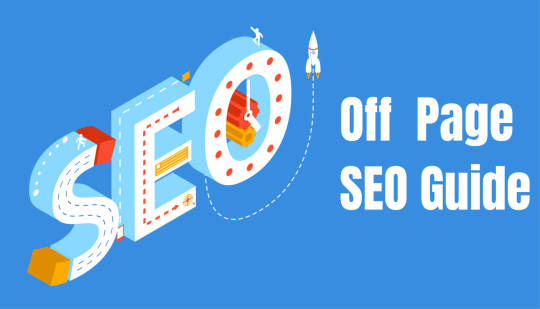
Key Off-Page SEO Services to Consider
1. Link Building
Link building is the backbone of off-page SEO. It involves acquiring high-quality backlinks from reputable websites.
Guest Blogging: Write valuable content for other websites in exchange for backlinks.
Broken Link Building: Find broken links on other sites and offer your content as a replacement.
Directory Submissions: List your business in niche-specific directories to improve visibility.
2. Social Media Marketing
Social signals indirectly impact SEO rankings. Sharing engaging content on platforms like Facebook, Twitter, and LinkedIn can increase website traffic and brand mentions.
3. Influencer Outreach
Collaborating with influencers in your niche can lead to backlinks and enhanced brand visibility. Influencers help create authentic connections with your target audience.
4. Content Marketing
Publishing shareable and link-worthy content (e.g., infographics, blogs, videos) attracts backlinks naturally and keeps your audience engaged.
5. Online Reputation Management (ORM)
Building a positive online reputation is crucial for trust. Engage in forums, respond to reviews, and maintain an active presence on professional platforms like LinkedIn.
6. Local SEO
For businesses targeting local audiences, optimizing your Google My Business profile and encouraging customer reviews are key off-page tactics.
Tips to Maximize the Impact of Off-Page SEO
Focus on quality over quantity when building backlinks.
Diversify your backlink sources for a natural link profile.
Use analytics tools like Google Analytics and Ahrefs to monitor performance.
Stay updated with the latest SEO trends and algorithm changes.
Common Mistakes to Avoid
Using Black Hat SEO Techniques: Buying backlinks or using spammy link farms can lead to penalties.
Ignoring Social Media: Overlooking the power of social signals can limit your SEO potential.
Not Tracking Results: Failing to analyze your efforts may result in wasted resources.

Conclusion
Off-page SEO is a vital component of a successful digital marketing strategy. By leveraging high-quality backlinks, social media engagement, and reputation management, you can significantly improve your website’s visibility and authority. For businesses aiming to dominate the SERPs, investing in professional off-page SEO services is not just an option—it’s a necessity.
Start enhancing your off-page strategy today and watch your online presence soar to new heights!
Ready to take your SEO game to the next level? Let our expert team craft a personalized off-page SEO strategy tailored to your needs. Contact us today
#seo services#social media marketing#digital marketing#seo expert#seo optimization#off page seo#smm services#smm marketing#search engine optimization
3 notes
·
View notes
Text
Boost Website Traffic: Proven Strategies to Increase Visitors Fast!

Driving traffic to your website is crucial for success, whether you’re running a blog, an online store, or an affiliate marketing business. Without visitors, even the best content or products won’t generate results. In this article, we’ll explore effective strategies to increase website traffic and attract targeted audiences to your site.
1. Optimize for Search Engines (SEO)
Search Engine Optimization (SEO) is one of the most effective ways to get free traffic from search engines like Google. Focus on:
Keyword Research: Use tools like Google Keyword Planner or Ubersuggest to find relevant keywords with high search volume.
On-Page SEO: Optimize your title tags, meta descriptions, and content with your target keywords.
Quality Content: Write in-depth, valuable content that answers users' questions and provides solutions.
Backlinks: Get high-quality backlinks from reputable websites to boost your domain authority.
2. Leverage Social Media Marketing
Social media platforms like Facebook, Twitter, Instagram, and LinkedIn are great for driving traffic. Here’s how:
Share Valuable Content: Post blog updates, infographics, and videos regularly.
Join Groups and Communities: Engage in niche communities related to your industry.
Run Paid Ads: Use social media ads to drive targeted traffic to your site.
Influencer Marketing: Partner with influencers to reach a larger audience.
3. Use Email Marketing
Email marketing helps you retain visitors and convert them into loyal customers. Here’s how to do it right:
Build an Email List: Offer a free eBook, checklist, or discount in exchange for emails.
Send Engaging Emails: Provide valuable content, exclusive offers, and personalized recommendations.
Automate Your Campaigns: Use email automation tools to send follow-ups and promotional emails.
4. Start Blogging and Guest Posting
Consistently publishing high-quality blog posts can help drive organic traffic to your site. Additionally, guest posting on reputable websites allows you to reach new audiences while gaining backlinks.
Write Long-Form Content: Articles with over 1,500 words tend to rank better on search engines.
Use Internal and External Links: Link to your other blog posts and authoritative sources to improve credibility.
Guest Post on Authority Websites: Find websites in your niche that accept guest contributions and include a link to your site.
5. Invest in Paid Advertising
If you want instant traffic, consider running paid ads:
Google Ads: Appear on the top of search results for competitive keywords.
Facebook & Instagram Ads: Target specific demographics for better engagement.
Native Ads: Blend your ads into content on high-traffic websites.
6. Utilize Viral Marketing and Giveaways
Encourage users to share your content by hosting giveaways or viral marketing campaigns. Offer valuable prizes in exchange for social shares, referrals, and engagement.
Conclusion: Start Boosting Your Website Traffic Today!
Increasing website traffic requires a combination of SEO, social media, email marketing, and paid strategies. The key is to stay consistent and track your results.
🔥 Want to supercharge your traffic and boost your online earnings? Check out these amazing tools that can help you drive thousands of visitors effortlessly! Click Here 🚀
#seo#website traffic#increase website traffic#how to increase website traffic#how to get traffic to your blog
3 notes
·
View notes
Text
The Advantages of Local SEO: How to Optimize Your Business for Local Search
About SEO

Search engine optimization (SEO) originated in the 1990s, when the internet was growing and search engines were being developed.Search engine optimization is the practice of improving a website's visibility and ranking in search engine results pages (SERPs). The goal of Search Engine Optimization is to increase the amount of traffic a website receives from search engines, which can lead to more clicks and potential customers. Here are some key components:
1. Google My Business (GMB)
Claim and optimize our GMB listing.
Ensure our business name, address, and phone number (NAP) are accurate.
Add business hours, photos, and a description of our services.
2. Local Keywords
Research and incorporate local keywords in our website content, meta titles, and descriptions.
To locate pertinent terms, use tools such as Ahrefs or Google Keyword Planner..
3. Citations
Ensure our business is listed on relevant local directories (Yelp, Yellow Pages, etc.).
Maintain consistency in our NAP across all platforms.
4. Reviews
Encourage satisfied customers to leave positive reviews on Google and other platforms.
Respond to reviews to engage with customers and show our business's responsiveness.
5. Local Content
Create content that resonates with our local audience (e.g., blog posts about local events).
Use local news, events, and activities to draw in traffic.
6. Mobile Optimization
Ensure our website is mobile-friendly, as many local searches are conducted on mobile devices.
7. Backlinks
Build backlinks from local websites, such as local news outlets, blogs, or community organizations.
8. Social Media
Involve with the local community through social media platforms.
Share local content and interact with customers to build a local Attendance.
9. Schema Markup
Use local business schema markup to help search engines understand our business details better.
10. Monitoring and Analytics
Track our local search performance using tools like Google Analytics and GMB insights.
Adjust our strategy based on what works best for your local audience.
Advantages of SEO
Enhanced Visibility:
Local SEO makes your company show up in local search results, which makes it simpler for local potential clients to locate you.
Targeted Traffic:
It attracts customers who are actively searching for services or products in your location, leading to higher conversion rates.
Cost-Effective Marketing:
Compared to traditional advertising, local SEO is often more affordable and can provide a better return on investment.
Enhanced Google My Business Presence:
Optimizing your local SEO improves your Google My Business listing, which can boost your visibility in local searches and Google Maps.
Community Engagement:
Local SEO encourages businesses to engage with their community, fostering relationships that can lead to repeat business and referrals.
Mobile Optimization:
Many local searches are performed on mobile devices, and local SEO strategies can help capture this on-the-go audience.
Improved Brand Credibility:
Ranking well in local search results can enhance your brand’s credibility and trustworthiness among potential customers.
Competitive Advantage:
Focusing on local SEO can help small businesses compete with larger companies that may dominate general search results.
Improved User Experience:
Local SEO frequently entails making your website more search engine friendly for local queries, which can enhance both the user experience and overall site performance..
Customer Insights:
Engaging in local SEO can provide valuable data about your audience’s preferences and behaviors, helping you tailor your offerings.
Best Practices for SEO Success
Stay Updated:
SEO is constantly evolving. Follow industry news to keep up with algorithm changes and trends.
Analyze Your Performance:
Use tools like Google Analytics and Google Search Console to monitor traffic and understand user behavior.
Be Patient:
SEO is a long-term strategy.Results might not be seen right away, but perseverance is rewarded..
Conclusion
In SEO is crucial for anyone looking to enhance their online presence. By understanding the fundamentals and implementing best practices, you can drive traffic, increase visibility, and ultimately grow your business. To learn more about Local SEO Sign up for the Advanced Digital Marketing program provided by Zypher Learning.
#local seo#advantages of local seo#search engine optimization#digital marketing#advantages of seo#google my business#business listing#mobile optimization#social media#social media marketing#business optimization
3 notes
·
View notes
Text
What is the best way to optimize my website for search engines?
Optimizing Your Website for Search Engines:
Keyword Research and Planning
Identify relevant keywords and phrases for your content
Use tools like Google Keyword Planner, Ahrefs, or SEMrush to find keywords
Plan content around target keywords
On-Page Optimization
Title Tags: Write unique, descriptive titles for each page
Meta Descriptions: Write compelling, keyword-rich summaries for each page
Header Tags: Organize content with H1, H2, H3, etc. headers
Content Optimization: Use keywords naturally, aim for 1-2% density
URL Structure: Use clean, descriptive URLs with target keywords
Technical Optimization
Page Speed: Ensure fast loading times (under 3 seconds)
Mobile-Friendliness: Ensure responsive design for mobile devices
SSL Encryption: Install an SSL certificate for secure browsing
XML Sitemap: Create and submit a sitemap to Google Search Console
Robots.txt: Optimize crawling and indexing with a robots.txt file
Content Creation and Marketing
High-Quality Content: Create informative, engaging, and valuable content
Content Marketing: Share content on social media, blogs, and guest posts
Internal Linking: Link to relevant pages on your website
Image Optimization: Use descriptive alt tags and file names
Link Building and Local SEO
Backlinks: Earn high-quality backlinks from authoritative sources
Local SEO: Claim and optimize Google My Business listing
NAP Consistency: Ensure consistent name, address, and phone number across web
Analytics and Tracking
Google Analytics: Install and track website analytics
Google Search Console: Monitor search engine rankings and traffic
Track Keyword Rankings: Monitor target keyword rankings

8 notes
·
View notes
Text
How to Sell Your Products Online
In the digital age, selling your products online is not just an option but a necessity for business success. The internet provides a vast marketplace, but standing out and making sales requires a strategic approach. Here’s a comprehensive guide to help you sell your products online effectively and attractively.
1. Define Your Target Audience
Understanding your target audience is crucial. Who are they? What are their preferences and pain points? Conduct market research to identify their demographics, interests, and buying behavior. This insight will shape your marketing strategy and product presentation, ensuring you connect with the right customers.
2. Choose the Right E-Commerce Platform
Selecting the right e-commerce platform is essential for your online sales success. Consider popular options like Shopify, WooCommerce, and BigCommerce. Look for features that match your business needs, such as customizable templates, payment gateways, and inventory management. A user-friendly interface and reliable customer support are also critical.
3. Create a Compelling Online Store
Your online store is your digital storefront, so make it visually appealing and user-friendly. Invest in a professional design that reflects your brand’s identity. High-quality product images, clear descriptions, and easy navigation will enhance the shopping experience and encourage purchases. Ensure your store is mobile-friendly, as many customers shop on their smartphones.
4. Optimize Product Listings
Effective product listings are key to attracting and converting buyers. Write clear, engaging product descriptions that highlight the benefits and features of your products. Use persuasive language and incorporate keywords that potential customers might use in their search queries. High-resolution images from multiple angles, along with videos if possible, can help customers make informed decisions.
5. Leverage Social Media Marketing
Social media platforms are powerful tools for reaching and engaging with your audience. Create and share content that resonates with your target market, including product showcases, behind-the-scenes looks, and customer testimonials. Use targeted ads to reach specific demographics and drive traffic to your online store. Platforms like Instagram, Facebook, and Pinterest can be particularly effective for visual products.
6. Implement SEO Strategies
Search Engine Optimization (SEO) helps improve your store’s visibility on search engines like Google. Optimize your website by using relevant keywords, creating high-quality content, and ensuring fast loading times. Implement on-page SEO techniques, such as meta tags and alt text for images, and build backlinks to boost your site’s authority and ranking.
7. Offer Excellent Customer Service
Providing exceptional customer service can set you apart from competitors and foster loyalty. Respond promptly to customer inquiries, offer multiple contact options, and provide clear information about shipping, returns, and exchanges. Positive reviews and testimonials can enhance your credibility and attract more buyers.
8. Utilize Email Marketing
Email marketing is a powerful tool for nurturing leads and driving sales. Build an email list by offering incentives like discounts or exclusive content. Send personalized emails to your subscribers, including product recommendations, promotions, and updates. Automated email campaigns can help you stay connected with your audience and encourage repeat purchases.
9. Monitor and Analyze Performance
Regularly monitor your online store’s performance using analytics tools. Track metrics such as website traffic, conversion rates, and average order value to gauge the effectiveness of your strategies. Analyze customer behavior to identify trends and areas for improvement. Use this data to make informed decisions and optimize your sales approach.
10. Adapt and Innovate
The online marketplace is constantly evolving, so staying adaptable is crucial. Keep an eye on industry trends, emerging technologies, and changing consumer preferences. Experiment with new marketing tactics, update your product offerings, and continually refine your strategies to stay competitive and meet your customers’ needs.
By following these steps, you’ll be well-equipped to successfully sell your products online. Focus on understanding your audience, optimizing your store, and delivering exceptional service to create a compelling and profitable online presence. Embrace the digital landscape, and watch your business thrive in the online marketplace.
2 notes
·
View notes
Text
Boost Your Website's Traffic Like a Pro
The Ultimate Guide to SEO: Boost Your Website's Traffic Like a Pro
So, you've heard about SEO but aren't quite sure what it is or how it works? Don't worry, you're not alone! SEO, or Search Engine Optimization, is like the secret sauce of the internet, and mastering it can take your website from crickets to buzzing with visitors. Let’s dive in and break it down, shall we?
What is SEO Anyway?
SEO stands for Search Engine Optimization. It's all about tweaking your website to make it more appealing to search engines like Google, Bing, and Yahoo. When these search engines love your site, they rank it higher in search results, making it easier for people to find you.
Think of search engines as librarians. When someone asks for information on "best pizza in town," the search engine (librarian) wants to deliver the most relevant, useful, and trustworthy information. SEO is how you convince the librarian that your pizza joint deserves to be at the top of the list.
Why Should You Care About SEO?
Imagine having the best pizza in town but your shop is hidden in a dark alley with no signs. Not great for business, right? That’s what it’s like to have a website without SEO. You could have amazing content, products, or services, but without good SEO, you’re essentially invisible online.
By optimizing your site, you:
Increase Visibility: More people find your website.
Boost Credibility: Higher rankings make you look more trustworthy.
Drive Traffic: More visitors mean more potential customers.
The Basics of SEO: On-Page vs. Off-Page
SEO can be split into two main categories: on-page and off-page.
On-Page SEO
This is everything you do directly on your website to improve its ranking. Here are some key elements:
Keywords: These are the words and phrases people type into search engines. Using the right keywords in your content is crucial.
Content Quality: Your content should be engaging, informative, and valuable. Think blog posts, articles, videos, and infographics.
Meta Tags: These are snippets of text that describe your page's content. They don’t appear on the page itself but in the page's code. Examples include meta titles and meta descriptions.
URL Structure: Clean, readable URLs help search engines understand your page content. For example, "yourwebsite.com/best-pizza-recipes" is better than "yourwebsite.com/12345".
Off-Page SEO
This involves activities that happen outside your website to boost its ranking. The most important aspects include:
Backlinks: These are links from other websites to yours. High-quality backlinks act as votes of confidence.
Social Signals: Likes, shares, and comments on social media can influence your rankings.
Guest Blogging: Writing articles for other websites can drive traffic back to yours and improve your SEO.
SEO Best Practices
Now that you know the basics, let’s talk about some best practices to ensure you’re on the right track.
Research Keywords
Before you start writing, research what your audience is searching for. Tools like Google Keyword Planner, Ahrefs, or SEMrush can help you find the right keywords.
Optimize Your Content
Once you have your keywords, sprinkle them naturally throughout your content. Don’t overdo it though—keyword stuffing can hurt your rankings. Aim for a natural flow and focus on creating valuable content for your readers.
Improve Page Speed
A slow website can frustrate visitors and hurt your rankings. Use tools like Google PageSpeed Insights to check your site’s speed and get tips on how to improve it.
Mobile-Friendliness
With more people browsing on their phones, having a mobile-friendly website is a must. Ensure your site looks and works great on all devices.
Build Quality Backlinks
Focus on getting backlinks from reputable sites in your industry. You can do this by creating high-quality content that others want to link to, or by reaching out to other site owners and influencers.
Keep Up with SEO Trends
SEO isn’t a one-time thing. Search engines are always updating their algorithms, so staying up-to-date with the latest trends and best practices is crucial. Follow SEO blogs, join forums, and consider taking online courses to keep your skills sharp.
Final Thoughts
SEO might seem daunting at first, but with a bit of effort and the right strategies, you can master it. Remember, it’s all about making your website more user-friendly, informative, and trustworthy. So start optimizing and watch your traffic soar!
#SEO#SearchEngineOptimization#DigitalMarketing#ContentMarketing#OnlineMarketing#SEOTips#GoogleRanking#MarketingStrategy#SEOExpert#SEOServices#SEOEngineOptimization#SearchOptimization#UIUXDesign#UXDesigners#WebDesignFirms#WebsiteDevelopers#SEOMarketing#WebsiteCreation#DesignerUIUX#SEOCompany#SEOAgency#WebsiteDesignFirms#MarketingSEO#UXUIDesigners#DevelopmentWebsites#WebDesignCompany#UIUXInterfaceDesign#AmericanEagleCom#SearchOptimizationAgency#WebsitesApps
2 notes
·
View notes
Text
Top Dofollow Social Bookmarking Sites List for 2024 with High DA
As you all already know that bookmarking a link is one of the best & beneficial ways to get backlink & drive some amount of traffic also. If you wish to bookmark a link on social bookmarking sites such as Google Bookmarks, Digg.com etc. then we value your efforts and would like to present to you this new social bookmarking sites list for 2023 with high DA. I am 100% sure that using these sites, your website's SERP rank will increase and you can follow backlinks also.
We are going to present you with 1100+ free social bookmarking sites at the end of this post that will make your job easier. We have tried and tested all of these social bookmarking sites, and all of them are working fine.
Read More : On First Page Seo Tips we make your website rank on Google
What is Social Bookmarking?
Social bookmarking is the process of storing favorite sites on websites like Digg, Mix, Reddit, Delicious or other social bookmarking sites for future use. Instead of using traditional bookmarks with folders as storage systems for our favorite websites, social bookmarking sites let you collect links that you want to save, making it easy for you to access them too. You can also share them with your friends too.
Social bookmarking also offers SEO advantages. They provide you backlinks. It is why free social bookmarking sites are widely used in the SEO industry. If you're looking for more backlinks and want your site ranked higher in search engines, high PR social bookmarking sites can be a great tool.
Benefits of Social Bookmarking Sites
After performing On-Page SEO of your website, the next and important activity that you perform is off-page SEO. In off-page SEO, social bookmarking is a top activity that is used to add links to other domains and get quality backlinks. When you start your off-page SEO activities, you must start directory submission and social bookmarking submissions. Doing social bookmarking of your links will help your website get indexed quickly, and this helps to rank your website for your target keywords.
4 notes
·
View notes
Text
How Local SEO Increases Profits: A Comprehensive Guide with Facts and Figures
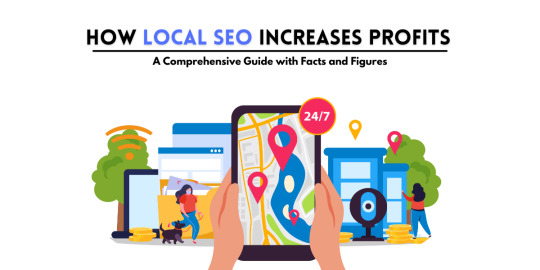
In today's digital landscape, businesses must leverage every tool available to stay competitive. Local SEO (Search Engine Optimization) is one of the most effective strategies for attracting customers in your geographic area. This comprehensive guide will explore how Local SEO can significantly enhance your profits, backed by facts and figures, and provide actionable tips to boost your local search presence.
What is Local SEO?
Local SEO focuses on optimizing a business's online presence to attract customers from specific localities. This includes appearing in local search results, Google Maps, and the coveted Google Local Pack.
Why is Local SEO Important?
Increased Visibility
Fact: 46% of all Google searches seek local information.
Figure: Businesses that optimize for local SEO can see a 14% increase in web traffic.
Higher Conversion Rates
Fact: 78% of mobile local searches result in an offline purchase.
Figure: Local searches contribute to 28% of all purchases.
Cost-Effective Marketing
Local SEO targets users actively seeking your services, leading to a lower cost per acquisition.
Key Components of Local SEO
1. Google My Business (GMB) Optimization
Claim and Verify Your Listing: Ensure that your GMB profile is active and verified.
Consistent Information: Keep your business name, address, and phone number (NAP) accurate across all platforms.
Engagement: Update your GMB listing with posts, photos, and promotions to engage customers.
2. Local Keywords
Keyword Research: Identify local search terms relevant to your business.
Implementation: Use these keywords in your website content, meta tags, and GMB listing.
3. On-Page SEO
Title Tags and Meta Descriptions: Optimize these elements with local keywords.
Schema Markup: Use schema to help search engines understand your business details.
4. Customer Reviews
Encouragement: Prompt satisfied customers to leave reviews on your GMB and other review platforms.
Response Strategy: Engage with all reviews—both positive and negative—to demonstrate that you value customer feedback.
5. Local Backlinks
Relationship Building: Network with local businesses and influencers to earn backlinks.
Community Engagement: Participate in local events or sponsorships to increase exposure and credibility.
Tips and Tricks to Boost Local SEO
Leverage Social Media: Share local content, promotions, and events to drive traffic and engagement.
Optimize for Mobile: Ensure your website is mobile-friendly, as a significant portion of local searches occurs on mobile devices.
Create Location-Specific Content: Develop blogs, guides, or resources that cater to local interests and events.
Use Local Citations: List your business in local directories like Yelp and Yellow Pages with consistent NAP information.
Monitor Analytics: Use Google Analytics and Google Search Console to track performance and refine your strategy.
Facts and Figures Supporting Local SEO Success
Search Engine Behavior: 88% of consumers who conduct a local search visit a related business within a day.
Consumer Trust: 92% of consumers trust online reviews as much as personal recommendations.
Mobile Searches: 76% of people who search for something nearby visit a business within a day.
Conclusion
Investing in Local SEO is essential for businesses looking to enhance their visibility and increase profits. By optimizing your online presence, focusing on local keywords, managing customer reviews, and building local backlinks, you can develop a strong local marketing strategy that drives business growth.
#Local SEO#Search Engine Optimization#Local search marketing#Google My Business#Local visibility#Local keywords#Local citations
1 note
·
View note
Text
10 Proven Lead Generation Strategies to Skyrocket Your Sales
Article by Jonathan Bomser | CEO | AccountSend.com
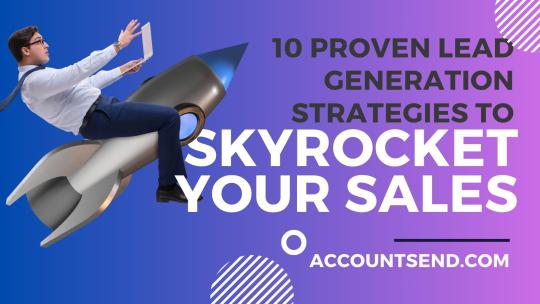
Lead generation plays a vital role in driving sales and expanding business growth. Discovering innovative ways to attract interested prospects is fundamental for any successful marketing strategy. Let's delve into ten proven strategies that will boost your lead generation efforts and propel your sales.
DOWNLOAD THESE STRATEGIES INFOGRAPHIC HERE
Targeted Content Marketing
Content marketing is a powerful way to attract and engage potential leads. By creating relevant and engaging content tailored to your target audience, you can establish yourself as an industry expert and attract quality leads.
Leverage Social Media
Social media platforms offer a treasure trove of potential leads. Utilizing platforms like LinkedIn, Twitter, and Facebook to share content, engage with followers, and promote your products can significantly boost your lead generation.
Email Marketing
Email marketing continues to be an effective way to reach potential customers. A well-crafted email campaign can help nurture relationships with prospects, keeping your brand top of mind when they're ready to purchase.
SEO Optimization
Ranking high on search engine results pages increases your visibility to potential leads. Invest time in SEO optimization, including keyword research, backlinking, and producing high-quality content, to boost organic traffic and attract more leads.
B2B Contact Database
A comprehensive B2B contact database can streamline your lead generation process. Leverage B2B data providers to access verified leads, then utilize CRM integration to manage and track your interactions with these leads.
Account-Based Marketing
Account-based marketing (ABM) focuses on personalizing marketing efforts towards specific accounts. ABM can increase your chances of converting high-value prospects into customers, thereby enhancing lead generation.
Participate in Industry Events
Industry events, conferences, and tradeshows provide excellent opportunities to connect with potential leads in your niche industries. Use these events to showcase your expertise, network with decision-makers, and generate quality leads.

Paid Advertising
Paid advertising platforms like Google Ads or Facebook Ads can help you reach a larger audience. By creating targeted ads, you can attract interested prospects and drive them to your website or landing pages.
Referral Programs
Customers are more likely to trust a business when referred by someone they trust. Establishing a referral program can encourage your current customers to recommend your business to others, thereby generating warm leads.
Webinars and Online Workshops
Hosting webinars or online workshops can help you share your knowledge and showcase your products or services. These platforms also offer the chance to collect contact information of attendees, providing you with a list of interested leads.
Implementing these proven lead generation strategies can not only attract potential customers but also set a solid foundation for future sales growth. By continually refining your approach, you can ensure a steady influx of leads, fueling your sales pipeline and driving your business forward.
#CEO#BusinessOwner#BusinessData#Marketing#Business#b2b#AccountSend#sales#BusinessGrowth#success#growth#data#MarketingStrategies#Entrepreneurship
17 notes
·
View notes
Text

The Ultimate Guide to Generating Backlinks for Enhanced Website Rankings
Backlinks remain a crucial factor influencing website rankings. Simply put, backlinks are links from one website to another, and they serve as a vote of confidence in the eyes of search engines. However, not all backlinks are created equal. To achieve better website rankings, it's imperative to understand the best practices for generating high-quality backlinks. In this comprehensive guide, we'll delve into the most effective strategies to acquire backlinks that boost your website's authority and visibility.
Understanding the Importance of Backlinks
Before delving into strategies for generating backlinks, let's underscore why they matter. Search engines like Google consider backlinks as indicators of a website's credibility, relevance, and authority within its niche. Websites with a robust backlink profile tend to rank higher in search engine results pages (SERPs), leading to increased organic traffic and visibility. Additionally, backlinks facilitate crawling and indexing of web pages, allowing search engines to discover and understand your content more efficiently.
1. Create High-Quality, Shareable Content
Content is King: Crafting Compelling Assets
Creating high-quality, shareable content lies at the heart of any successful backlink strategy. Content that educates, entertains, or solves a problem for your target audience is more likely to attract backlinks naturally. Invest in producing comprehensive guides, informative articles, captivating infographics, or engaging videos that resonate with your audience's interests and needs.
Leverage Content Promotion
Merely creating stellar content isn't enough; you must also promote it effectively. Share your content across social media platforms, engage with relevant online communities and influencers, and reach out to industry websites or blogs for potential collaborations or guest posting opportunities. The more exposure your content receives, the higher the likelihood of attracting backlinks from authoritative sources.
2. Harness the Power of Guest Blogging
Strategic Outreach: Building Relationships
Guest blogging remains a potent tactic for acquiring high-quality backlinks while establishing thought leadership and expanding your online presence. Identify reputable websites or blogs within your niche that accept guest contributions. Craft well-researched, insightful articles that add value to their audience while subtly incorporating links back to your own website. Building genuine relationships with editors or website owners can lead to recurring guest blogging opportunities, further enhancing your backlink profile.
3. Explore Broken Link Building
Turning Setbacks into Opportunities
Broken link building involves identifying broken or outdated links on external websites and offering your own content as a replacement. Start by prospecting for websites relevant to your niche that contain broken links. Reach out to the website owner or webmaster, politely informing them of the broken link, and suggest your content as a suitable replacement. This mutually beneficial approach not only helps the website owner fix broken links but also earns you valuable backlinks in return.
4. Engage in Resource Link Building
Positioning Your Content as a Valuable Resource
Resource link building involves creating comprehensive, informative resources such as industry reports, whitepapers, or curated lists that serve as valuable references for your target audience. Reach out to relevant websites, blogs, or online directories in your niche, offering your resource for inclusion. Websites are more likely to link to resources that provide genuine value to their audience, thereby enhancing your backlink profile.
5. Foster Relationships with Influencers and Industry Experts
Collaborative Partnerships: Amplifying Your Reach
Building relationships with influencers and industry experts can open doors to valuable backlink opportunities. Engage with influencers through social media, attend industry events or webinars, and offer to contribute expert insights or interviews for their content. By aligning your brand with reputable figures in your niche, you not only gain exposure to their audience but also increase the likelihood of earning backlinks from their websites or social media profiles.
Generating backlinks remains a cornerstone strategy for enhancing website rankings and driving organic traffic. By prioritizing the creation of high-quality content, leveraging guest blogging opportunities, exploring innovative tactics such as broken link building and resource link building, and nurturing relationships with influencers and industry experts, you can build a robust backlink profile that propels your website to greater visibility and authority within your niche.
FAQs
Q1: How many backlinks do I need to improve my website's rankings? A: There's no definitive answer as the quantity of backlinks is less important than their quality. Focus on acquiring high-quality backlinks from authoritative websites relevant to your niche.
Q2: Are paid backlinks a viable option for improving rankings? A: While it may be tempting to purchase backlinks, it's not recommended as search engines like Google penalize websites engaged in manipulative link schemes. Opt for organic methods to acquire backlinks and prioritize quality over quantity.
Q3: How long does it take to see the impact of backlinks on my website's rankings? A: The impact of backlinks on rankings can vary depending on various factors such as the authority of the linking site, the relevance of the content, and the competitiveness of your niche. Generally, you may start noticing improvements within a few weeks to months, but consistent efforts are key to long-term success.
2 notes
·
View notes
Text

#_How_to_increase_website_traffic
Adding website business involves a combination of strategies that concentrate on perfecting your point's visibility, applicability, and appeal to your target followership. Then are some effective ways to boost your website business
Hunt Machine Optimization( SEO):
Optimize your website for hunt machines by using applicable keywords in your content, meta markers, and heads.
produce high- quality, precious content that addresses your followership's requirements and interests.
Build high- quality backlinks from estimable websites.
Content Marketing:
Develop a content strategy that includes blog posts, papers, vids, and other engaging content.
Partake your content on social media platforms to reach a wider followership.
produce shareable and link- good content that encourages others to link to your point.
Social Media Marketing :
Partake your content on popular social media platforms applicable to your target followership.
Engage with your followers by responding to commentary, asking questions, and sharing in conversations.
Use social media advertising to reach a larger followership.
Dispatch Marketing:
Figure and maintain an dispatch list to regularly communicate with your followership.
shoot out newsletters, updates, and elevations to keep your followership engaged and informed.
Donated Advertising :
Use online advertising platforms similar as Google Advertisements, Facebook Advertisements, or other platforms applicable to your followership.
Set a budget and target specific demographics to maximize the effectiveness of your advertisements.
Optimize Website Performance:
Insure your website is presto, stoner-friendly, and mobile- responsive.
Optimize images and use a content delivery network( CDN) to ameliorate lading times.
Guest Blogging:
Contribute guest posts to other estimable websites in your niche.
Include a link back to your website in your author memoir or within the content.
Influencer Marketing :
Partner with influencers in your assiduity to reach their followers.
Influencers can produce content, reviews, or elevations that drive business to your point.
Analytics and Monitoring :
Use analytics tools( similar as Google Analytics) to track your website's performance.
Cover the sources of your business and acclimate your strategies grounded on what works best.
Flash back that erecting sustainable business takes time and thickness. Regularly modernize your content, acclimatize your strategies grounded on analytics, and stay engaged with your followership across different channels.
-
Contac Me : [email protected]
WhatsApp : +8801708896598
#seo#canada#bdoutsourcing#seotips#SEOKJIN#seomarketing#seoul#seostrategy#website#websitedesign#wordpress#realestate#usa#italy#Fiverr#socialmedia#adsonreels#followers#foryou
6 notes
·
View notes
Text
The Ultimate SEO Checklist for Online Coaches in 2024
As an online coach in 2024, leveraging SEO is paramount to attracting more clients and establishing your authority in a competitive digital landscape. SEO, or Search Engine Optimization, is a crucial tool for improving your online visibility and driving organic traffic to your coaching website. Below is the ultimate SEO checklist tailored for online coaches looking to optimize their digital presence effectively.
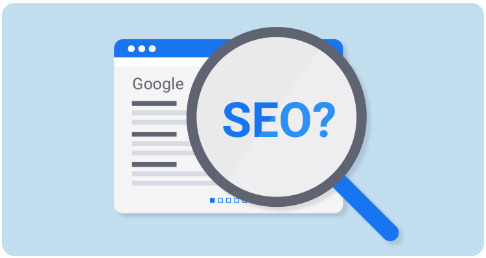
1. Comprehensive Keyword Research
Begin with thorough keyword research to identify terms your potential clients are searching for. Focus on long-tail keywords related to your coaching niche, services, and common questions your audience might have. Tools like Google Keyword Planner, Ahrefs, or SEMrush can provide valuable insights into search volume and competition levels.
2. Optimized Website Structure
Ensure your website has a clear, logical structure that’s easy for both users and search engines to navigate. Use a straightforward menu with clearly labeled sections and a sitemap to help search engines crawl your site more effectively.
3. High-Quality, Relevant Content
Content is king in the world of SEO. Produce high-quality, informative blog posts, articles, and resources that address the needs and questions of your target audience. Regularly updating your site with fresh content can improve your search engine rankings and keep visitors coming back.
4. On-Page SEO Optimization
For every piece of content you create, ensure you're implementing on-page SEO best practices. This includes using your chosen keywords in titles, headers, meta descriptions, and throughout the content in a natural, reader-friendly way. Also, optimize images by compressing them for faster loading times and using descriptive file names and alt text.
5. Mobile Responsiveness
With the majority of internet browsing now done on mobile devices, your website must be mobile-friendly. Google uses mobile-first indexing, so a responsive design that adjusts to various screen sizes is essential for SEO.
6. Page Load Speed
A slow website can significantly increase your bounce rate and negatively impact your SEO. Use tools like Google PageSpeed Insights to check your site’s speed and follow the recommendations to improve load times, such as compressing images and minimizing the use of large files.
7. Secure Website with HTTPS
Security is a top priority for Google and your potential clients. Ensure your website uses HTTPS encryption to protect user data and improve your site’s trustworthiness and search ranking.
8. Backlink Strategy
High-quality backlinks from reputable websites in your niche can greatly enhance your SEO. Focus on building relationships with other coaches, industry websites, and influencers to earn links that boost your site’s authority.
9. Local SEO for Local Coaches
If you offer coaching services in a specific area, local SEO can be incredibly beneficial. Claim your Google My Business listing, include local keywords in your content, and ensure your business is listed accurately on local directories.
10. Analyzing and Refining Your SEO Strategy
SEO is not a set-it-and-forget-it task. Use tools like Google Analytics and Google Search Console to track your website's performance, understand how visitors are finding you, and identify areas for improvement. Regularly reviewing and updating your SEO strategy based on performance data is key to staying ahead in search rankings.
11. Engaging Social Media Presence
While social media doesn’t directly influence SEO rankings, it can drive traffic to your website and increase your online visibility. Share your content on social media platforms where your potential clients are active, and engage with your audience to build your brand.
12. User Experience (UX)
Google values websites that provide a good user experience. This includes easy navigation, fast load times, and engaging, valuable content. Ensure your website is designed with the user in mind to not only satisfy search engines but convert visitors into clients.
This SEO checklist for online coaches in 2024 highlights the importance of a comprehensive, multi-faceted approach to optimizing your online presence. By following these steps, you can improve your visibility in search engine results, attract more potential clients, and establish yourself as a leading authority in your coaching niche.
4 notes
·
View notes
Text
How to Start SEO for a New Website Search Engine Optimization
Launch Your Website to the Top A Comprehensive SEO Starter Kit
Launching a new website is an exciting endeavor, but without effective Search Engine Optimization (SEO), your website may struggle to gain visibility amidst the vast expanse of the internet. In this comprehensive guide, we'll delve into the essential steps to kickstart SEO for your new website and pave the way for enhanced online presence and visibility.
1. Conduct Thorough Keyword Research
The foundation of any successful SEO strategy begins with keyword research. Identify the key terms and phrases relevant to your website's niche and target audience. Utilize tools such as Google Keyword Planner, SEMrush, or Ahrefs to uncover valuable insights into search volume, competition, and keyword variations. Choose keywords that strike a balance between search volume and competitiveness, ensuring they align with your website's content and objectives.
2. Optimize On-Page Elements
Optimizing your website's on-page elements is crucial for maximizing its visibility in search engine results. Focus on the following key areas:
Meta Tags
Craft compelling meta titles and meta descriptions for each page, incorporating relevant keywords while accurately summarizing the content. Ensure your meta tags are enticing to users and aligned with search engine guidelines.
Quality Content
Create high-quality, engaging content that addresses the needs and interests of your target audience. Incorporate your target keywords naturally within the content, avoiding keyword stuffing. Aim to provide valuable insights, solutions, or entertainment to your visitors.
URL Structure
Optimize your website's URL structure by including relevant keywords and ensuring they are descriptive and user-friendly. Clear, concise URLs not only improve search engine visibility but also enhance user experience and navigability.
3. Build Off-Page Authority
Off-page SEO activities play a pivotal role in establishing your website's authority and credibility within your industry. Focus on the following strategies:
Link Building
Acquire high-quality backlinks from reputable websites within your niche. Seek opportunities for guest blogging, influencer collaborations, or directory listings to earn valuable inbound links that signal trust and authority to search engines.
Social Media Engagement
Engage with your audience on social media platforms to foster brand awareness, community engagement, and content sharing. Active participation on social channels can amplify your content's reach and attract valuable referral traffic.
4. Ensure Technical Optimization
Technical SEO involves optimizing your website's technical infrastructure to enhance its performance and accessibility. Pay attention to the following aspects:
Site Speed
Optimize your website's loading speed to improve user experience and reduce bounce rates. Minimize server response times, leverage browser caching, and optimize image sizes to expedite page loading times.
Mobile Responsiveness
Ensure your website is mobile-friendly and responsive across various devices and screen sizes. Google prioritizes mobile-friendly websites in its search results, making mobile optimization essential for SEO success.
Site Structure
Organize your website's navigation and structure in a logical hierarchy, making it easy for users and search engines to navigate. Implement clear categories, internal linking, and breadcrumb trails to facilitate seamless exploration.
Conclusion: Launching Your SEO Journey
Embarking on the journey of SEO for your new website is a strategic investment in its long-term success and visibility. By following these essential steps – conducting thorough keyword research, optimizing on-page elements, building off-page authority, and ensuring technical optimization – you can establish a strong foundation for your website's SEO efforts. Remember, SEO is an ongoing process of refinement and adaptation, so stay vigilant, stay informed, and watch your website climb the ranks in search engine results.
If you want to read more information about how to boost traffic on your Website just visit --> The Insider's Views
5 notes
·
View notes
Text
Boost Your SEO: High-Quality Backlinking Sites ( Google Drive Link )
In the competitive world of SEO, backlinks reign supreme. They act as votes of confidence from other websites, telling search engines like Google that your content is valuable and deserves to be seen. But building a strong backlink profile can be expensive, leaving many websites struggling to compete. Fear not, budget-conscious SEO warriors! This article unveils a treasure trove of high-quality backlinking sites that won't cost you a dime.
2024's Guide to High-Quality Dofollow Backlink Sites
Top Free Backlink Building Sites in 2024
Top Profile Creation Site List for Backlinks in 2024
Top Instant Approval Blog Commenting Sites List (2024)
Top Free Guest Posting Websites in 2024
Disclaimer: While these sites offer free backlinks, remember, quality matters more than quantity. Focus on building relevant, contextual links from websites with good domain authority. Spammy tactics can actually harm your SEO, so proceed with caution and prioritize quality over sheer number.
Unleash the Power of Directories:
Industry-Specific Directories: List your website in relevant online directories within your niche. These directories often offer free basic listings, providing a valuable backlink and increased visibility within your target audience.
Local Directories: Claim and optimize your Google My Business listing, along with other local directories like Yelp and Bing Places. Local SEO is crucial, and these platforms offer free listings to boost your local search ranking.
Content is King (and Can Earn You Backlinks):
Guest Blogging: Contribute high-quality articles to established blogs in your niche. This not only builds backlinks but also positions you as an expert and drives targeted traffic to your website.
Forum Engagement: Actively participate in relevant online forums and communities. Share valuable insights, answer questions, and link back to your website where appropriate. Remember, genuine engagement is key, not just spamming links.
Get Creative with Social Media:
Share Engaging Content: Regularly share informative, visually appealing content on social media platforms. Encourage users to share and link back to your website, organically building backlinks.
Run Social Media Contests: Host contests and giveaways that require participants to share your content or link back to your website. This can be a fun and effective way to generate buzz and backlinks.
Embrace the Power of User-Generated Content:
Encourage Reviews and Testimonials: Display positive reviews and testimonials on your website, and encourage satisfied customers to share them on other platforms. This can lead to organic backlinks from review sites and social media.
Run User-Generated Content Contests: Encourage users to create content related to your brand or niche, offering rewards for the best submissions. This can generate backlinks from user profiles and social media shares.
Remember: Building a strong backlink profile takes time and effort. Utilize these free resources strategically, focusing on quality and relevance. With patience, persistence, and a dash of creativity, you can achieve SEO success without breaking the bank!
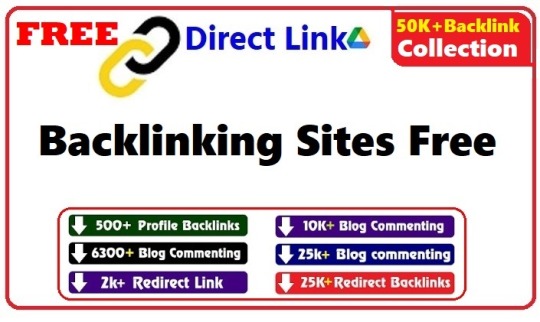
Bonus Tip: Utilize free backlink analysis tools like Ahrefs Backlink Checker or Moz Open Site Explorer to monitor your backlink profile and identify potential opportunities.
Disclaimer: I am not affiliated with any of the websites mentioned in this article. Please do your own research before submitting your website to any directory or platform.
4 notes
·
View notes